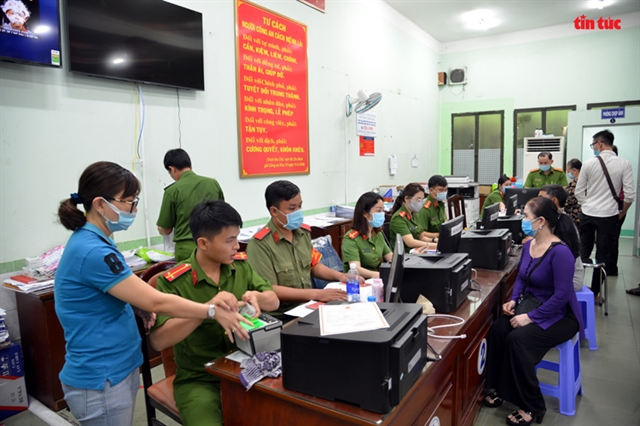 Society
Society

All State administrative units in HCM City have improved in performing their assigned missions after two years of implementing a project to develop and apply population data and electronic identification and authentication to serve the national digital transformation.

|
| HCM City police officers carry out procedures for granting chip-based identification cards to citizens. — VNA/VNS Photo Mạnh Linh |
HCM CITY — All State administrative units in HCM City have improved in performing their assigned missions after two years of implementing a project to develop and apply population data and electronic identification and authentication to serve the national digital transformation.
The municipal People’s Committee on February 20 held an online meeting to summarise the results of the project in the city.
Presenting a report at the meeting, deputy director of the city’s Public Security Department Trần Đức Tài said that the department, the standing agency of the Steering Committee for the project, has strictly followed the directions of central State administrative units and ministries while delivering timely consultation to the municipal People’s Committee and Party Committee.
Since launching the project two years ago, it has adopted various measures to clean up citizen data and help city dwellers update or register for a new version of citizen identification cards to simplify administrative procedures related to residence management.
The city considers the project as one of the core parts of a digital economy, digital society, digital government and smart city by 2030, said Dương Anh Đức, vice chairman of the municipal People's Committee.
“It will provide favorable conditions for the growth of Vietnamese digital businesses and help to complete the plans and programmes set by the municipal Party Committee,” he said.
Until now, 17 of 35 digital transformation models have been successfully implemented in the city, including launching software among accommodation businesses and hospitals (ASM), cashless payment among all schools in the city, disease diagnosis and treatment via chip-based citizen ID cards and the VNeID app, and digital signature provision via the VNeID app.
Issuing chip-based citizen identification cards is a key task to bring people's activities to the digital environment.
For the last two years, the police force has formed mobile teams inside hospitals or to visit individuals to help them create their own cards, followed by proper account activation.
So far, nearly 7.7 million ID cards and more than 5.5 million accounts at level 2 have been activated successfully.
The city has been able to link and share data in its electronic one-stop information system with the national population database.
The progress of digitised results of administrative procedures in the city has reached 96 per cent, with 276 procedures partly online and 464 fully online.
According to the city’s Department of Education and Training, there are still certain difficulties when identifying the residence status of students whose permanent address is not in the city, leading to a need to access the temporary residence data.
Võ Thị Trung Trinh, director of the city’s Centre for Digital Transformation, said that in the future, the city needs to link its system to the databases of ministries and State agencies because many systems are now not compatible with the current system of the city.
Another problem comes from the implementation of public digital signatures, which requires more public awareness, she said.
These signatures are free of charge for only one year when carrying out public services (not free for other transactions), but this period should be extended, she added.
Chairman of the city People's Committee Phan Văn Mãi highly appreciated the smooth cooperation between State agencies at all levels and the police force in the city for the past two years.
"The achievements have provided valuable lessons not only for the city itself but for central state units, with the aim of successfully completing the project,” he said.
He asked relevant agencies to work together to address current problems, and strictly follow the approved plans and directions from the Central unit so that the project is associated with the city’s digital transformation programme.
“For administrative procedures to be done on digital platforms by 2025, there must be plans to develop public services and a single app for citizens to use conveniently,” he said.
The city now has three steering committees, including one for implementing the project, one for administrative reform, and another for digital transformation.
He asked the city’s Department of Home Affairs to consider combining the three committees into one for more effective management and operation.
In the near future, the city will finish all project-related missions and turn this into a criterion for annual evaluations of State unit leaders. — VNS